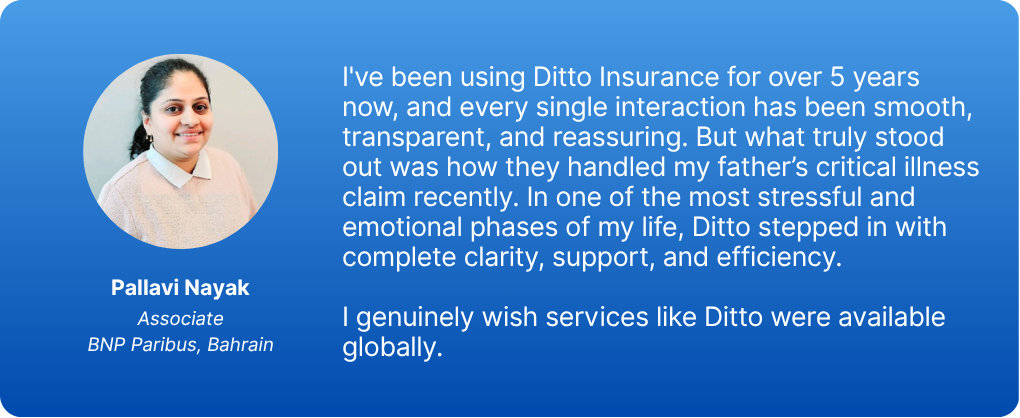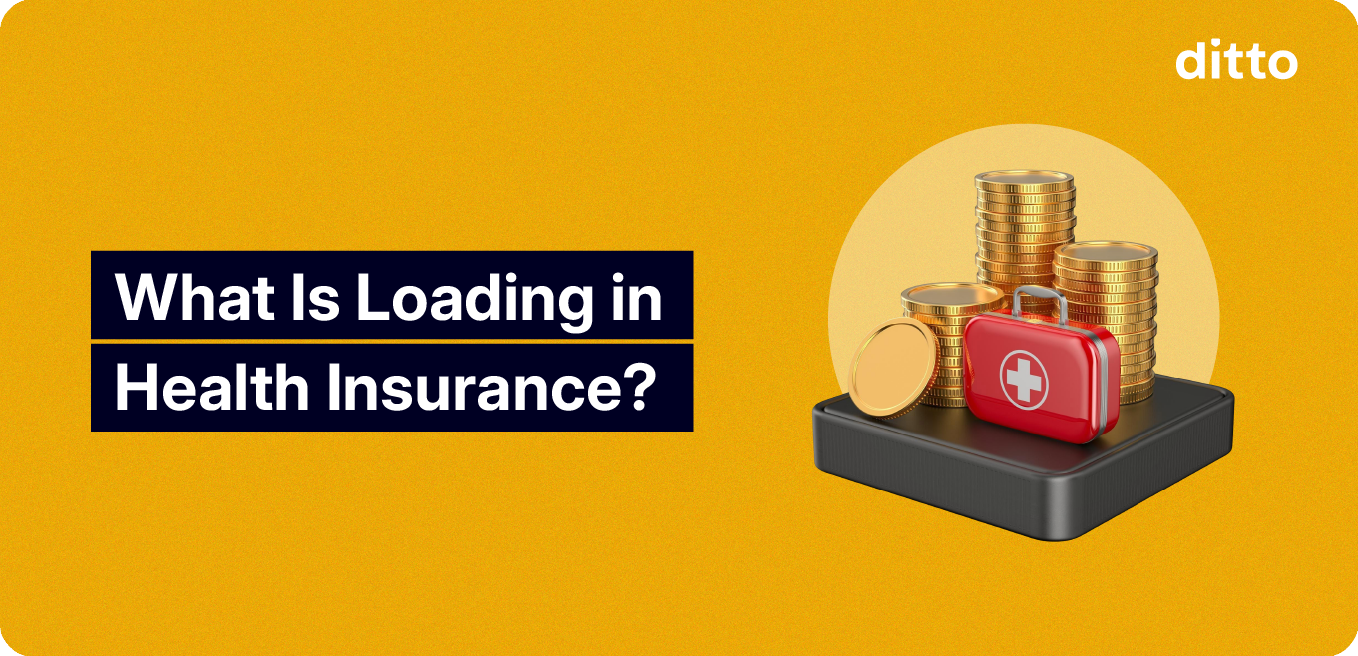What is Loading in Health Insurance?
When buying a health plan, you may be told that your premium will be slightly higher due to loading charges in health insurance. This can sound worrying at first, but loading is a standard, regulated pricing tool used by insurers to balance risk and keep health plans sustainable.
In this article, we explain what loading in health insurance means, how the loading amount in health insurance is calculated, the different types of loading you may encounter, and what rights you have as a policyholder under IRDAI rules.
How Loading Works in a Health Insurance Policy?
Here’s how loading in health insurance is applied in practice:
- You submit a proposal along with medical history, lifestyle details, and disclosures.
- The insurer underwrites your case. Every insurer is required by IRDAI to follow a Board-approved underwriting policy.
- Based on underwriting, the insurer may:
- Accept the policy at normal premium
- Accept the policy with loading
- Accept with exclusions, waiting periods, or co-payment (depending on the policy)
- Reject the proposal (this must be communicated with reasons)
- If loading in health insurance is applied, it is calculated as:
- A percentage of the base premium (most common), or
- A fixed extra premium (less common)
- IRDAI mandates that insurers disclose any underwriting loading in writing and issue the policy only after the customer explicitly agrees to the higher premium.
What are the Factors Affecting Loading in Health Insurance?
- Age and Health Profile: Insurers consider your age, medical history, and pre-existing conditions when calculating loading in health insurance. Older individuals typically require more frequent and costly treatments, while a history of chronic or serious illnesses, such as diabetes, heart disease, or hypertension, increases the likelihood of future claims, leading to higher loading charges in health insurance. Some insurers even specify disease-wise maximum loading limits in their prospectus or policy wording.
- Lifestyle Habits: Smoking, heavy drinking, or obesity are linked to serious health issues, so insurers factor these habits into the premium.
- Family Medical History: If serious hereditary diseases run in your family, insurers may anticipate higher health risks and add a loading to your premium.
- Occupation-based (hazard) loading: Applied to individuals in higher-risk jobs such as field-based roles, hazardous work environments, or high-risk and high-stress occupations, where the likelihood of injury or illness is greater. While uncommon in retail health insurance, it may be applied in specific cases.
- Geography or zone-based pricing: Some health plans have different premiums based on city or zone due to treatment costs. While people often call this “loading,” it is usually part of the plan’s base pricing, not underwriting loading.
Types of Loading in Health Insurance
- Initial Premium Loading: When you apply for a policy, the insurer evaluates your risk based on factors like age, medical history, and lifestyle. If you are considered a higher risk, the extra cost is included in your first premium itself. Typically, it ranges from 10% to 100% of the base premiums.
- Claim-Based Loading: Earlier, large individual claims could raise renewal premiums. In India, individual claim-based loading is now discontinued. Insurers may revise premiums only at renewal, based on age or medical inflation, and at an aggregate portfolio level, so a single claim won’t spike your premium mid-policy.
Note: IRDAI has capped annual premium increases at 10% for senior citizens. Insurers must seek prior approval to exceed this limit. This applies to overall rate revisions, not individual medical loadings, helping limit year-to-year premium increases.
These renewal rules are clearly laid out in the IRDAI (Health Insurance) Regulations, 2016, along with policy wordings of all insurers, which specify how insurers must handle policy renewals, premium revisions, and claim-related conditions.

Why Do Insurers Apply Loading Charges in Health Insurance?
Fairness within the risk pool
If everyone paid the same premium, low-risk customers would heavily subsidise high-risk customers.
Sustainability of the health plan
Higher expected claims require higher pricing to keep the plan financially viable.
To offer coverage instead of rejection
Loading in health insurance often allows insurers to accept higher-risk applicants rather than denying coverage altogether.
How Is Loading Calculated in Health Insurance?
- Percentage-based loading: Most insurers use a percentage-based approach. The loading amount in health insurance is calculated as a percentage of your "Base Premium".
Note: Any loading in health insurance applied at policy issuance usually continues at renewal and also applies when you increase your Sum Insured, unless the insurer chooses to remove it. - Fixed amount loading: Also called “Flat Extra”, it is a type of health insurance loading where the insurer adds a fixed rupee amount to your base premium instead of applying a percentage.
It is usually used for constant, non-medical risks such as hazardous occupations or risky hobbies, where the risk does not increase with age. Unlike percentage-based loading, a fixed amount stays the same each year, even as your base premium changes.
Example of Premium Calculation With Loading Charges
Scenario: Applicant has multiple risk factors (high BMI and smoking).Base premium: ₹10,000
After assessing the overall risk profile, the insurer applies a single consolidated loading of 30% on the member.
Total loading (30%): ₹3,000Final payable premium: ₹13,000
Note: Loading in health insurance is applied at the member level, not per illness or habit. The final loading reflects the combined risk profile and is subject to internal caps defined in the insurer’s underwriting policy.
Medical Conditions That Attract Loading Charges
Health insurance premium loading varies based on the type, severity, control, and duration of a medical condition. Below is an indicative range for some commonly disclosed conditions, based on market observations.
Important disclaimer: The percentages below are illustrative only. IRDAI does not prescribe fixed loading slabs. Actual loading, if any, is determined by each insurer’s Board-approved underwriting policy and may differ significantly based on individual health details.
For individuals with multiple medical conditions, insurers typically apply a single consolidated loading based on the overall risk profile. In some cases, if the risk is considered high, the proposal may be offered with exclusions, waiting periods, or declined altogether.
Note: Some conditions like fully cured cancer or a hysterectomy operated over a year ago might result in a "permanent exclusion" for that specific condition rather than a premium loading.
What Happens if Loading is Applied?
If the company decides to apply a premium loading, they will send you a counter-offer letter.
- Notification: You will be informed about the proposed loading, waiting periods, or permanent exclusions.
- Acceptance: You must provide specific acceptance within 15 days of receiving the letter. Upon acceptance, an additional link will be sent to pay the extra amount, after which your policy will be issued.
- Cancellation: If you do not respond within 15 days, the application is cancelled, and any premium paid initially will be refunded within 7 days.
Low-Loading Insurance Plans in India
While all health insurance plans undergo underwriting, some are generally seen as more low-loading friendly. They often use waiting periods or standard conditions instead of permanently increasing premiums for mild or well-controlled health issues. Based on market observations and advisor experience, plans such as Care Supreme, Star Assure, Star Comprehensive, and Care Plus are frequently cited for minimising/no loadings in many cases (not guaranteed). However, all applications are still subject to underwriting, and final decisions depend on individual risk assessment.
Plans That Use Loading to Cover Higher-Risk Profiles
Some feature-rich health insurance plans use loading as a way to cover higher-risk individuals, rather than rejecting them. For example:
- HDFC ERGO Optima Secure is known for transparent renewals and automatic increases in coverage.
- Niva Bupa ReAssure 2.0 offers Age-Lock to limit age-based premium hikes.
- Care Supreme often uses waiting periods instead of heavy loading.
- Aditya Birla Activ One Max allows healthy behaviour to offset the impact of loading through rewards.
Difference Between Loading and Exclusions in Health Insurance
Let’s clear up a common confusion: loading is not the same as “exclusions.” Here’s how they’re different:

Things to Keep in Mind about Loading in Health Insurance
Difference from age-based premium increases
Age-based premium hikes are standard and apply uniformly to everyone within an age band. Loading, on the other hand, is a personalized charge applied specifically due to individual risk factors such as medical history, BMI, or lifestyle habits.
Renewal premiums cannot be linked to personal claim history
In individual health insurance, insurers cannot increase premiums based on your claims. Any revision must apply at the product or portfolio level and be driven by factors like medical inflation or overall claims experience.
No fresh underwriting at renewal if coverage is unchanged
Insurers cannot conduct fresh medical underwriting at renewal as long as the sum insured remains the same.
Loadings differ across insurers for the same condition
There is no standard loading rate mandated by IRDAI. Each insurer follows its own underwriting guidelines. This means two insurers may charge different loading percentages or even take different approaches (loading vs. exclusion), for the same medical condition.
Possibility of reduction or removal
While insurers may state that lifestyle-based loadings (such as for smoking or high BMI) can be reviewed if your risk profile improves, our advisors have not seen cases where loading charges were actually removed at renewal. Note that any reduction or removal of premium loading remains entirely at the insurer’s discretion and should not be treated as a guaranteed outcome.
Why Approach Ditto for Health Insurance?
At Ditto, we’ve assisted over 8,00,000 customers with choosing the right insurance policy. Why customers like Pallavi below love us:

- No-Spam & No Salesmen
- Rated 4.9/5 on Google Reviews by 15,000+ happy customers
- Backed by Zerodha
- Dedicated Claim Support Team
- 100% Free Consultation
Confused about the right insurance? Speak to Ditto’s certified advisors for free, unbiased guidance. Book your call now, slots fill up fast!
Final Thoughts
For consumers, the most important step is full and honest disclosure in terms of loading in health insurance. Always declare your medical history, lifestyle habits, BMI, and occupation accurately at the proposal stage. Non-disclosure may seem tempting, but it can lead to claim rejection later, which is far more expensive than paying a loading charge.
If a loading is applied, review it carefully before giving consent. Understand why it has been charged, whether it applies permanently, and how it will affect future premiums. Since loading practices vary across insurers, it is wise to compare policies as a different insurer may offer coverage with a lower loading or a different underwriting approach.
Disclosure: The companies referenced in this article are Ditto’s partner insurers. To understand how Ditto works and how we evaluate insurers and plans, check out Ditto’s Cut.
Frequently Asked Questions
Last updated on:










